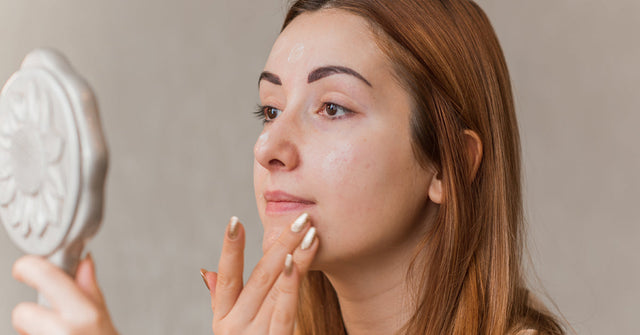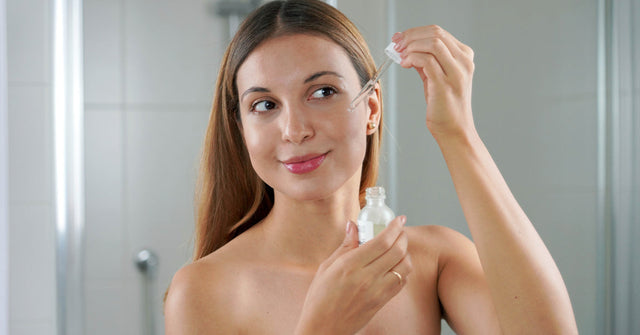Exfoliation is a vital step in your skincare routine, as it can renew the skin's surface by removing dead cells and revealing a fresh, radiant complexion. However, as with any skincare practice, it’s important to maintain a delicate balance. Over-exfoliation, whether through abrasive physical scrubs or potent chemical treatments, can lead to irritation, dryness, and compromised skin barrier function. Over-exfoliated skin may also cause symptoms such as redness, sensitivity, tightness, or breakouts. If this occurs, it's important to work on repairing and restoring your skin's health.
Understanding Over-Exfoliation
Over-exfoliation occurs when you apply treatments frequently or use products that are too harsh for your skin type. This may compromise the skin's protective barrier and leave it vulnerable, causing discomfort and long-term damage if not addressed promptly. Signs of over-exfoliated skin can vary from person to person but often include:
- Redness: Persistent redness, especially after applying skincare products
- Dryness and Tightness: The skin feels overly dry, tight, or "squeaky" clean after cleansing
- Increased Sensitivity: The skin becomes more sensitive to touch, products, or environmental factors
- Flakiness: Visible flaking or peeling, particularly in areas like the cheeks, forehead, or around the mouth
Steps to Repair Over-Exfoliated Skin
1. Cease Exfoliation Immediately
The first step in treating over-exfoliated skin is to halt all skin exfoliation treatments. This includes physical scrubs, chemical exfoliants, and even rough cleansing brushes. Give your skin a chance to rest and recover from the excessive stimulation.
2. Cleanse Gently
Switch to Dermpura cleanser, a mild, hydrating formula that won't strip the skin of its natural oils. It includes potent ingredients like glycerin, rose moschata seed oil, and chondrus crispus that help to hydrate and soothe the skin while effectively removing impurities. Cleanse your face with lukewarm water using gentle circular motions to avoid further irritation.
3. Hydrate and Moisturize
Apply hydrating products to replenish lost moisture and strengthen the skin barrier. Opt for a gentle, alcohol-free toner followed by a moisturizer containing soothing ingredients such as snow algae, cloudberry, or hyaluronic acid to restore the skin's natural moisture balance and reduce inflammation. Consider Infusoderm Deep Hydration Daily Moisturizer for effective hydration and skin barrier support.
4. Soothe with Calming Ingredients
Incorporate products enriched with calming ingredients known for their anti-inflammatory properties into your skincare routine. Aloe vera gel, chamomile extract, and green teas are excellent choices for reducing redness and soothing irritated skin. Apply these products generously to affected areas to promote healing and comfort.
5. Avoid Harsh Products and Fragrances
During the recovery phase, steer clear of skincare products containing harsh ingredients, fragrances, or alcohol, as they can further irritate and exacerbate over-exfoliated skin. Opt for hypoallergenic and non-comedogenic formulas that are gentle on sensitive complexions.
6. Use Sun Protection
Protect your skin from UV damage by applying a broad-spectrum sunscreen with SPF 30 or higher daily, regardless of the weather or your indoor activities. Sunscreen shields the skin from harmful UV rays and prevents further damage and pigmentation issues that may arise from over-exfoliated skin.
7. Practice Patience and Consistency
Repairing over exfoliated skin takes time and patience. Stick to a simplified skincare routine focused on hydration, gentle cleansing, and soothing ingredients. Be consistent with your daily regimen to allow the skin to heal and regain its natural balance over time.
8. Consult a Dermatologist if Needed
If your skin does not show signs of improvement or if symptoms worsen despite your efforts, consider consulting a dermatologist. A skincare professional can assess your skin condition, provide personalized recommendations, and prescribe treatments to expedite healing and prevent long-term damage.
DIY Exfoliation Alternatives
While your skin heals, consider trying gentle DIY alternatives to traditional skin exfoliation methods:
- DIY Lip Scrub: Mix sugar or salt with honey or coconut oil to create a natural lip scrub. Gently massage onto lips to remove dead skin cells and smooth the surface.
- DIY Body Scrub: Combine coffee grounds, sugar, or salt with olive or coconut oil to create a body scrub. Use circular motions to exfoliate your skin in the shower, then rinse off thoroughly.
- DIY Scalp Scrub: Mix brown sugar or sea salt with a few drops of olive or argan oil to create a scalp scrub. Apply it to a damp scalp, gently massage using a circular motion, and rinse thoroughly before shampooing.
- DIY Face Scrub: Combine finely ground oatmeal or baking soda with water or yogurt to create a gentle face scrub. Apply the mixture to damp skin, massage gently, and rinse off with lukewarm water.
Frequently Asked Questions
What happens if I over-exfoliate?
Over-exfoliation can lead to irritation, dryness, increased sensitivity, redness, and compromised skin barrier function, making the skin more susceptible to damage and breakouts.
How to fix over-exfoliation?
To fix over-exfoliation, immediately cease exfoliating, focus on gentle cleansing and moisturizing, and incorporate soothing ingredients to restore skin balance and hydration.
Can over-exfoliating cause dark skin?
Yes, over-exfoliating can potentially cause darkening of the skin. This is especially true if it leads to irritation and inflammation, which can trigger increased melanin production.
How often to exfoliate the face?
For most skin types, exfoliating the face 1-3 times per week is generally recommended to maintain a smooth and radiant complexion without causing irritation or over-exfoliation. Adjust the frequency based on your skin's sensitivity and response to products.
Conclusion
In conclusion, over-exfoliated skin requires immediate attention and gentle care to repair and restore its natural balance. By recognizing the signs of over-exfoliation and following the steps we have outlined, you can effectively heal your skin, prevent further damage, and promote a healthier appearance. Remember, achieving a healthy, radiant complexion is a journey that requires patience, consistency, and a deep understanding of your skin's needs.
Mentioned in this article
More stories

How To Treat Hormonal Acne Naturally At Home?








